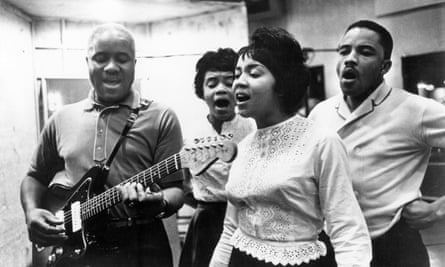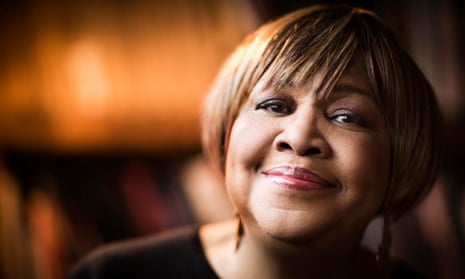Sixty years ago, before rock’n’roll had ignited, a 16-year-old took the lead on a huge-selling hit. “Well, well, well, Lord,” she sang, “they tell me I got a home beyond the skies.” Her voice sounded years older than her age, raw with longing, deeper than the seas. Uncloudy Day kickstarted the Staple Singers’ career and was Mavis Staples’ big, bold hello to the world.
Now 76, she’s still raw, and not saying goodbye yet. It’s late afternoon in Rutland, Vermont, and Staples is mid-reminiscence about her extraordinary life. Tonight she plays one of many gigs to promote her 13th solo album, Livin’ on a High Note (it’s her 42nd overall, if you include her family’s back catalogue). “Once I go home from the road, I’m ready to go again,” she says. “It’s all I’ve done all my life.”
Her career highlights are legion. In the 60s, the Staple Singers were civil rights icons, writing songs about the black experience, and performing them at Martin Luther King’s meetings and folk festivals. In the 70s, they were funky as hell: I’ll Take You There and Let’s Do It Again were million-selling US No 1s. Prince brought Staples out of semi-retirement at the height of his fame in the 80s, writing two solo albums for her: she calls him her son. “I text him to let him know that I know what he’s up to,” she says, with a laugh. In recent years, she has been produced by Wilco’s Jeff Tweedy, performed Talking Heads’ Slippery People with Arcade Fire on stage, and Nick Cave and Neko Case, among others, have written songs for her new LP.
But it is David Bowie that she is desperate to talk about today, surprisingly. “I’ve been thinking of him. He was the ultimate gentleman and musician. I was opening for Prince, when he came into the dressing room, and said: ‘There she is, that beautiful lady,’ and, oh, I just melted!” She can’t countenance that Bowie might have been excited to meet her. “You just don’t think that certain people know you, you know? To remember him holding my hand … I did not sleep that night!”

Humility runs like a thread through Staples’ career. She was born in Chicago in 1939; her father, Roebuck, known as Pops, grew up on a Mississippi plantation, learning guitar from delta blues legend Charley Patton, before forming the family band. Mavis was called Bubbles by her mum on account of her cheeriness, a fact one of her new collaborators, New Orleans singer-songwriter Benjamin Booker, has snuck on to her new album’s opening track, Take Us Back (“They don’t call me Bubbles for nothing,” Mavis rasps, brilliantly). By 13, Mavis was out on the road, getting extra homework for missing school on Mondays (she’d be singing at churches on Sundays). It was wonderful, she insists. “It wasn’t like the Jackson 5 and poor Michael – I didn’t miss my youth. We’d rehearse at home and then I’d go out to jump rope if it was summertime. I didn’t miss my prom neither!”
Staples also loved “ordering room service as a kid, although I’d call down and the lady would say, ‘Yes, Mr Staples,’ because of my voice.’” That voice had many fans though – as well as Bowie and Prince, there was Bob Dylan. “It was the most mysterious thing I’d ever heard,” he told AARP Magazine of Uncloudy Day as recently as last year. He first heard the Staple Singers on the radio in 1953, and has often mentioned their influence on him ever since. “It was like the fog rolling in … I knew who Mavis was without having to be told. Her singing just knocked me out.”
“Bobby would always say: ‘Pops has a velvety voice, but Mavis get rough sometimes,’” Staples says. It’s a line she has used in previous interviews, but they did “court awhile”, after meeting on a TV show in New York in the early 60s. “We would write letters back and forth, because we wouldn’t see each other until we were on a festival together,” she adds. “And we’d smooch!” Dylan also proposed to her, but Staples turned him down, feeling she was too young.
They’ve stayed in touch through the years, duetting on the gospel song Gonna Change My Way of Thinking on Dylan’s 1979 album, Slow Train Coming; they last physically met in 2002. “I often think about what would have happened if I’d married Bobby, though,” she says. “If we’d had some little plum-crushers, how our lives would be. The kids would be singing now, and Bobby and I would be holding each other up.”
Staples still sings the political songs she became known for back then, like Why (Am I Treated So Bad)?, written by her father for the Little Rock Nine, the black children whose parents fought for them to attend the all-white Arkansas school. She’ll never stop singing those songs, she says. “They’re still relevant. You know, sometimes I can watch the news on the television and I feel like I’m back in the 60s.” Her new album also features MLK Song, based around a Martin Luther King speech Staples remembers hearing, put together by her producer, M Ward. Her vocals on it are unshowy and obviously from the heart: “In the march for peace / Tell them I played the drum / When I have to meet my day,” she sings.
Getting older is something she thinks about a lot, given that song. “It puts a wonder on your mind. I’m losing all of my friends, and you really wonder how much longer you have, and how it will be when you leave. But whenever I have to go, I feel like I’m ready. I feel like I have lived a wonderful life.” This is also why Livin’ on a High Note is a consciously joyful record, inspired by Staples’ favourite song of recent years, Pharrell Williams’s Happy. “When I first heard it, wow, it just lifted me up. I told my songwriters I wanted songs just like that, that would make people smile, also because I’ve been making people cry for so long.” She glows as she mentions tUnE-yArDs’ track, Action, and Nick Cave’s contribution, Jesus, Lay Down Beside Down Me. The latter, as its title suggests, is particularly provocative, but she loves it. “When I first heard the words, I said, ‘Woah. I’m going to comfort Jesus instead of him comforting me.’”
Staples has never got big for her boots. She still goes to the grocery store, she says. “I go to the cleaners, I go down in the basement to wash my clothes. I don’t have anyone running around for me like some of my girlfriends, Gladys Knight or Aretha – I’ve always done for myself. I feel if you don’t go out there, if you don’t mingle among the people, how are you going to know what they need to know, and hear what they need to hear? That’s the good part. That’s the best part. Just treat everyone right.”
Livin’ on a High Note is released by Anti- on 19 February. The documentary Mavis is released on the same day.

Comments (…)
Sign in or create your Guardian account to join the discussion